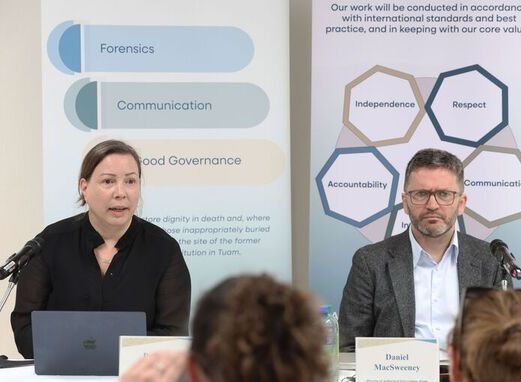Turtle Bunbury's latest book is "Ireland's Forgotten Past."
Page Turner / By Peter McDermott
“The Night of the Big Wind,” which took place on Jan. 6-7, 1839, may be one of the better known episodes in Turtle Bunbury’s “Ireland’s Forgotten Past,” in part because Beatrice Coogan, mother of Tim Pat, wrote a popular novel about it (reissued a couple of years back), but more so due to the fact that exactly 70 years after the event, in January 1909, the Old Age Pensions Act came into effect, which was “likened to the opening of a new factory on the outskirts of every town and village in Britain and Ireland.”
As so few births were officially registered before 1864, the Irish Pensions Committee decreed that if someone’s age had “gone astray” on them, they would be eligible for a pension if they could state that they were “fine and hardy” on the Night of the Big Wind, or the Oíche na Gaoithe Móire.
The ill wind may have blown some good all those decades later, but Bunbury describes just how terrifying and traumatic the hurricane was to Ireland’s 8 million people at the time. We hear of what happened to Lord Castlemaine, a Limerick-based German farmer named Jacob Stuffel, John O’Donovan, who was leading a team of geographic surveyors in Glendalough, Co. Wicklow, and the woman in Clare Street, Dublin, whose chimney collapsed, one of 4,846 the authorities said didn’t survive the night.
“‘Ireland’s Forgotten Past’ is a tour through some of the lesser known aspects of Ireland’s history. I went back in time, way back, kicking off with a tetrapod that lived 385 million years ago. Much of the book is about the impact of the different people who settled or invaded the country over the centuries, but always with an eye on the characters themselves,” said Bunbury, whose broadcasting CV includes his time as co-host of “The Genealogy Roadshow” on RTE. “The cast includes a tailor who kitted out Oliver Cromwell’s redcoats, a spymaster who became Ireland’s most notorious priest-hunter, a fun-loving charmer who founded the Hellfire Club and a brothel queen who steamed asparagus to whet her client’s appetite. The last chapter is about a remarkable Red Cross initiative that saw Ireland take the lead in looking after orphaned German children after the Second World War.”
This unorthodox take on Ireland’s history does, however, have plenty of kings, queens and other royalty involved. Chapter 13, for instance, tells of Edward the Bruce’s ill-fated campaign in the early 1300s to “forge a Scots-Irish alliance that would oust the Anglo-Norman barons and would establish a ‘Pan-Gaelic Greater Scotia,’ in which the Bruce family would rule over Scotland, Ireland and, in due course, Wales.”
By way of contrast, Chapter 18 recounts the tale of the “remarkably serene” rule by European standards of the Maguires, who held sway in Fermanagh from 1264 through 1589.
In an early review of this brand new book, the Yorkshire Times said “acclaimed broadcaster, writer and journalist Turtle Bunbury has pulled off a feat of exquisite skill — the upholding of a mandate to edify entertainingly without overwhelming his audience in scholarly aridity.”

Turtle Bunbury
Date of birth: 1972
Place of birth: Dublin
Spouse: Ally
Children: Jemima, 12, Bay, 11
Residence: County Carlow
Published works include: “Ireland’s Forgotten Past,” “1847,” “Vanishing Ireland,” T”he Glorious Madness,” “The Irish Pub,” “Easter Dawn.”
What is your writing routine? Are there ideal conditions?
I live in the countryside, County Carlow, and work from home. As of January 2020, I am blessed with a shed, an outdoor office made of Siberian timber, which is hidden behind a grassy knoll in our garden. It has a carpet, a kettle, a mega-efficient heater, bright lights, loudspeakers and an incredible view of the Wicklow Mountains.
My ideal day involves settling behind my desk by 8:30 a.m. and remaining there until I re-join my wife for a kitchen lunch. Once the belly is filled, I bank another undisturbed run in the office before my daughters return from school. If weather permits, I then walk through the surrounding fields for 45 minutes with our dog, and maybe a daughter or two. Back to the desk, head down, ideally knocking off by 6:30 but, if I need to work late, I’ll dash back to the Siberian shed where the midnight oil burns well.
What advice do you have for aspiring writers?
If you want your book to sell, be prepared to do a lot of the marketing and promotional stuff yourself. I self-published my first two books 15 years ago, which was a very useful exercise. It gave me an insight into how the publishing industry works, and taught me how to improve a book’s selling potential. For instance, if a book is "face out" in a book shop, its chances of selling are greatly better than if the book is on its spine. So, if you're invited to talk about your book on radio or TV, let the bookshop know and then maybe they will ensure your book is "face out."
Name three books that are memorable in terms of your reading pleasure.
Morgan Llewelyn, “Lion of Ireland”; George McDonald Fraser, “Mr American”; Sebastian Barry, “Days Without End.”
What book are you currently reading?
Herbie Brennan, “Nectanebo: Traveller from an Antique Land.”
Is there a book you wish you had written?
George R. R. Martin, “A Song of Ice and Fire.”
Name a book that you were pleasantly surprised by.
Peter Barton, “Not Fade Away.”
If you could meet one author, living or dead, who would it be?
Anonymous.
What book changed your life?
Hunter S. Thompson, “Fear and Loathing in Las Vegas.”
What is your favorite spot in Ireland?
I have a zillion but, close to home, I set my sights on the seven-hectare hill-fort of Rathgall where they manufactured exotic glass beads and jet bracelets three thousand years ago.
You're Irish if...
You commence every conversation with a stranger by talking about the weather on the day that’s in it.









